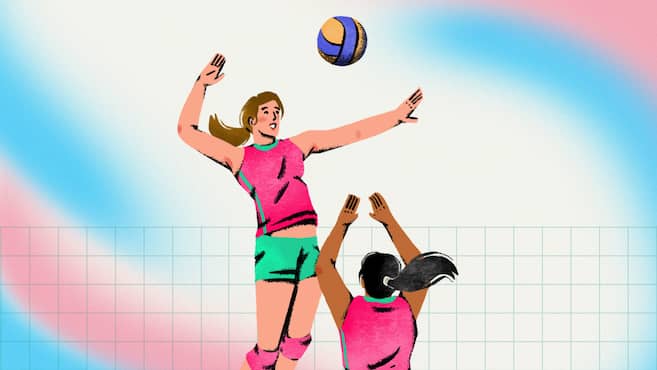

Cut fails in favor of trans women excluded from volleyball competition in Antioquia
Photo: Dissent
Summary and Fast Informame
Listen to this article
Audio generated with Google
In a ruling that marks a precedent in the recognition of the rights of trans people in the sport, the Constitutional Court covered a trans player that was excluded from a female competition organized by the Antioquia Volleyball League. The decision, taken by the Eighth Review Chamber, considered that the measure applied by the League constituted a form of discrimination. The High Court concluded that this restriction violated fundamental principles such as equality, participation in sports spaces and respect for gender identity.
This is the case of Emiliana Castrillón, trans player of the Volleyball team of the Jaime Isaza Cadavid Polytechnic, who was excluded in 2024 of the tournaments organized by the Antioquia Volleyball League. At the time, she denounced that, through a letter delivered untimely, the League informed her that she could not continue to compete in the women's category due to her gender identity, according to the regulations of the tournament, which had been modified in March of that same year. “In the female branch, the condition of having been born a woman must be fulfilled,” reads in the letter they gave him on April 1, 2024.
At that time, the athlete had been playing volleyball for more than eight years and had participated in several tournaments without problems. In an interview with different media, he said that this was the first time he faced a situation of discrimination of this type, which led her to file a guardianship action that would reach the First Municipal Promiscuous Court of Amagá.
In May 2024, the Court issued a ruling in which it recognized that Castrillón met the requirements of testosterone levels, a rule also used by organizations such as the International Olympic Committee to allow the participation of trans women in female powers, collecting the national and international jurisprudence on the subject. In addition, he added that, although all women have the right to compete on equal terms, “having been born a woman” does not constitute a fair way to guarantee it.
In fact, over time, the Olympic Committee has changed its rules on the participation of trans people in sports. In the beginning, it demanded that trans athletes underwent a medical intervention of gender statement. Later, he eliminated that requirement and only asked to maintain their testosterone levels below a limit for at least a year before competing. But in November 2021, given the lack of conclusive scientific evidence on whether or not there is a competitive advantage, the Committee decided to leave the decision on what criteria in these cases in the hands of each federation.
This is how his case reached the Eighth Review Chamber of the Constitutional Court, made up of magistrates Natalia Ángel Cabo and Cristina Pardo Schlesinger, together with Judge José Fernando Reyes Cuartas.
When checking the guardianship, the high court indicated that the Volleyball League acted without taking into account the trajectory of the player or its sports history on equal terms. He stressed that the athlete had competed without obtaining unfair advantages, maintained hormonal levels comparable to those of her teammates and did not represent a threat to equity in the game. For the Court, the measure adopted ignored its identity and context, unfairly affecting its right to participate.
In #JusticiaClarawe explain the order to the Antioquia Volleyball League to modify its regulations and the warning that, at the time of adopting any regulation on the participation of trans sportsmen, will not be able to implement full exclusion measures
1/2 pic.twitter.com/TdQUKOeG3X
– Constitutional Court (@cconstitional) October 1, 2025
Although the Volleyball Antioquia League explained that it modified the regulation because some teams and athletes complained about the participation of trans women in the women's category, and said the measure sought to guarantee “fair and balanced competition”, the Court said that these arguments were general and without specific evidence in the case of Emiliana. It was not shown that she had an advantage or that it represented a risk for the other players.
In Judgment T-179 of 2025, the Court analyzed the different positions that exist on the participation of trans women in sports powers, as well as “the arguments on which they are based and the constitutional relevance of each of them,” says magistrate Reyes. In this process, he affirmed that there is no clear scientific evidence that confirms that trans athletes have a competitive advantage over senior athletes, that is, those that are identified with the genre that were assigned to them at birth.
In addition, he explained that any possible advantage depends on many factors, such as body composition, training, food, hormonal treatments and the personal context of each athlete.
In the case of Emiliana Castrillón, he considered that the League had to take into account four aspects: that the athlete had a decade playing volleyball after his transition process, that his testosterone levels were equal or lower than those of the other players, who had always competed in the women's category and that he had not presented any situation that showed that he had an unfair advantage or that he put at risk to others.
“In cases like this, it is essential to analyze the peculiarities of each situation to establish a solution that responds to the specific context of the athlete and assess, case by case, the arguments of all parties involved. This obligation is transferred to the sports authorities,” reads the sentence.
Thus, the High Court ordered the Antioqueña Volleyball League to allow Emiliana Castrillón to participate in all tournaments and urged him to modify article 4 of the Regulation to eliminate the exclusion of trans women. In addition, the Ministry of Sports ordered him to accompany the League in this process and review the regulations of other volleyball leagues, to ensure that they do not contain rules that exclude transporters absolutely.
What implies that the Constitutional Court has given this judgment?
That the Constitutional Court has issued a sentence on this case has a scope that goes beyond Emiliana. Their decision recognizes that trans people have the right to participate in equal conditions in spaces such as sport, without being excluded by prejudices or discriminatory rules. In addition, this sentence feels a precedent that forces the leagues and sports authorities to review and adjust their regulations, ensuring that gender identity is respected and each case is analyzed individually.
Opening other analyzes, in the real problem is not the participation of trans people in sports tournaments, but the stereotypes and prejudices that still exist towards those who have diverse gender identities. In previous conversations with The spectatorJuan Pablo Molinos, Sports Secretary of the Argentine Federation LGBT (FALGBT), explained that trans people are very little represented in competitive sport and that, in general, the competitions do not dominate.
The Constitutional Court Judgment in the case of Emiliana Castrillón establishes a legal precedent on the participation of trans people in the sport in Colombia. By ordering the modification of regulations that absolutely exclude and demand the individual analysis of each situation, the Court reinforces the need to apply norms that respect fundamental rights and take into account the context of each athlete.
🟣📰 To learn more news and analysis, visit the section of Gender and diversity of The spectator.
✉️ If you have an interest in gender or information issues that you consider timely to share, please write to any of these emails: lasigualadasoficial@gmail.com o ladisidenciaee@gmail.com.

